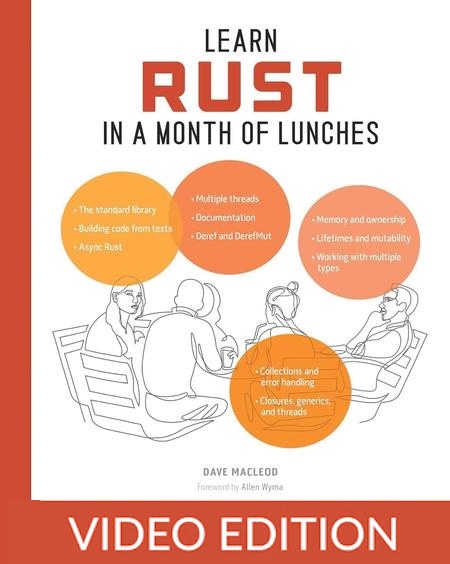English | MP4 | AVC 1280×720 | AAC 44KHz 2ch | 11h 16m | 1.53 GB
One month. One hour a day. That’s all it takes to start writing Rust code!
Learn Rust in a Month of Lunches teaches you to write super fast and super safe Rust code through lessons you can fit in your lunch break. Crystal-clear explanations and focused, relevant examples make it accessible to anyone—even if you’re learning Rust as your first programming language.
By the time you’re done reading Learn Rust in a Month of Lunches you’ll be able to:
- Build real software in Rust
- Understand messages from the compiler and Clippy, Rust’s coding coach
- Make informed decisions on the right types to use in any context
- Make sense of the Rust standard library and its commonly used items
- Use external Rust “crates” (libraries) for common tasks
- Comment and build documentation for your Rust code
- Work with crates that use async Rust
- Write simple declarative macros
- Explore test driven development in Rust
Learn Rust in a Month of Lunches is full of 24 easy-to-digest lessons that ease you into real Rust programming. You’ll learn essential Rust skills you can use for everything from system programming, to web applications, and games. By the time you’re done learning, you’ll know exactly what makes Rust unique—and be one of the thousands of developers who say it’s their best loved language!
Learn how to create fast powerful programs in Rust in just 24 short lessons! Rust gives you modern features like a top-notch compiler, a rich ecosystem of pre-built libraries, and the same low-level performance you get with a language like C, but without the awkward syntax, complex memory management, and code safety concerns. This book guides you step by step from your first line of code.
Learn Rust in a Month of Lunches breaks down the Rust language into concise hands-on lessons designed to be completed in an hour or less. The examples are fun and easy to follow, so you’ll quickly progress from zero Rust knowledge to handling async and writing your own macros. You won’t even need to install Rust—the book’s code samples run in the browser-based Rust Playground. There’s no easier way to get started!
What’s inside
- Build working Rust software
- Understand messages from the compiler and Clippy
- Use external Rust “crates” (libraries) for common tasks
- Explore test driven development in Rust
Table of Contents
1 Comments
2 Declaring variables and code blocks
3 Display and Debug
4 Floats
5 Mutability (changing)
6 Primitive types Integers, characters, and strings
7 Shadowing
8 Smallest and largest numbers
9 Some basics
10 Summary
11 Type inference
12 Hello, World! and printing
13 Copy types
14 Giving references to functions
15 Memory, variables, and ownership
16 More about printing
17 More on references
18 Mutable references
19 Shadowing again
20 Strings
21 Summary
22 Variables without values
23 const and static
24 Control flow
25 More complex types
26 Summary
27 Building your own types
28 Destructuring
29 References and the dot operator
30 Summary
31 Generics, option, and result
32 Option and Result
33 ummary
34 More collections, more error handling
35 Summary
36 The operator
37 When panic and unwrap are good
38 Getting around the orphan rule with newtypes
39 Summary
40 Taking a String and a &str in a function
41 The From trait
42 The orphan rule
43 Traits Making different types do the same thing
44 Closures and closures inside iterators
45 Iterators
46 Iterators and closures
47 Summary
48 Iterators and closures again!
49 Summary
50 The dbg! macro and .inspect
51 Interior mutability
52 Lifetime annotations
53 Lifetimes and interior mutability
54 Summary
55 Cow
56 Multiple threads
57 Multiple threads and a lot more
58 Rc
59 Summary
60 The todo! macro
61 Type aliases
62 Arc
63 Channels
64 More on closures, generics, and threads
65 Scoped threads
66 Summary
67 impl Trait
68 Box
69 Box and Rust documentation
70 Summary
71 Summary
72 Test-driven development
73 Testing
74 Testing and building your code from tests
75 Default, the builder pattern, and Deref
76 Deref and DerefMut
77 Summary
78 The builder pattern
79 Const, unsafe Rust, and external crates
80 Const functions
81 Introducing external crate
82 Mutable statics
83 Summary
84 Unsafe Rust
85 Anyhow and thiserror
86 Blanket trait implementations
87 Rayon
88 Rust s most popular crates
89 Summary
90 Time in the standard library
91 chrono
92 lazy static and once cell
93 Rust on your computer
94 Summary
95 Using files
96 Working with user input
97 cargo doc
98 Async Rust
99 Feature flags
100 More crates and async Rust
101 Summary
102 A tour of the standard library
103 Associated items and associated constants
104 Floats
105 Integers
106 OsString and CString
107 String
108 Summary
109 Vec
110 bool
111 char
112 Continuing the tour
113 Other macros
114 Setting panic hooks
115 Summary
116 The standard library prelude
117 Viewing backtraces
118 Reading macros from the standard library
119 Summary
120 Using macros to keep your code clean
121 Writing basic macros
122 Writing your own macros
123 Summary
124 Terminal stopwatch and clock
125 Typing tutor
126 Unfinished projects Projects for you to finish
127 Wikipedia article summary searcher
128 Directory and file navigator
129 Laser pointer
130 Summary
131 Unfinished projects, continued
Resolve the captcha to access the links!
